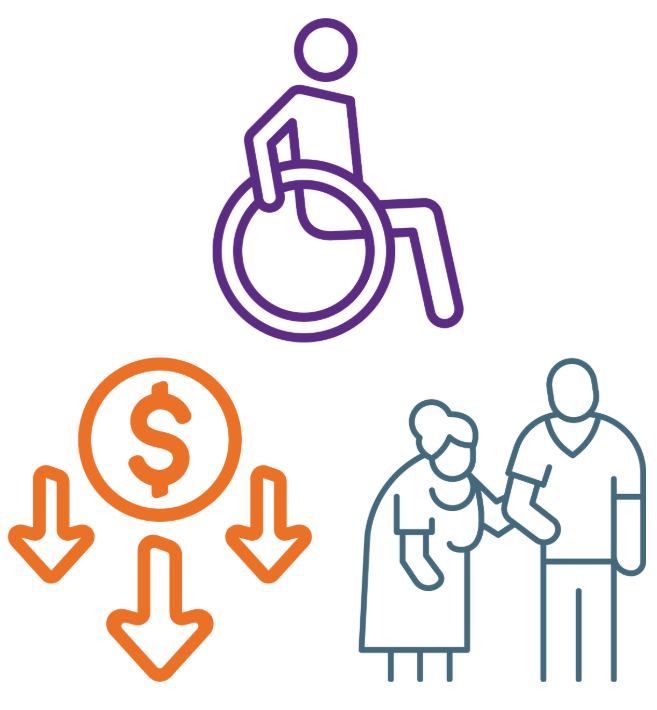Social Security
The Social Administration continues to run two programs designed to support people with disabilities financially. These programs can enable people to work towards greater social and economic independence in some cases, and respect years of hard work in others. These programs are know as Supplemental Security Income (SSI) and Social Security Disability Insurance (SSDI). Please read through the information for each program carefully! They sound similar, but are very different.
Program Differences at a Glance
Supplemental Security Income
- Does not require any previous work experience
- In Virginia, if you are eligible for SSI, you are eligible for Medicaid
- There are set income and asset limits. Income limits change in January every year.
- There are Work Incentive programs to help you work and keep your benefits up to a point.
- SSI is publicly funded through people's taxes
- The monthly maximum Federal amounts for 2025 are $967 for an eligible individual, $1,450 for an eligible individual with an eligible spouse, and $484 for an essential person.
Social Security Disability Insurance
- You have to have worked a certain number of hours to qualify
- Monthly payment amounts depend on your work history
- Family and Survivors may be eligible for part of your Disability benefits
- Disabled adult children of parents getting SSDI or retirement benefits can receive payments based on their parents' earning record
- SSDI is funded by you/your parents, and is based on your work history
Supplemental Security Income (SSI)
Eligibility Basics
Adults and children might be eligible for SSI if they have:
- Little or no income, and
- Little or no resources, and
- A disability, blindness, or are age 65 or older.
As of 2025, a single person who earns $2,019 or less from work each month meets the income limit. The income limit increases for couples and when parents apply for children. Social Security will also look at other sources of income besides your job, like disability benefits, unemployment, and pensions.
They also calculate your resource limit, which must not be more than $2,000 for a person or $3,000 for a couple.
If you are applying based on disability, you must prove you have a disability that:
- Affects your ability to work for a year or more, or
- Will result in death, or
- Severely limits daily activity (for children with disabilities).
If you have a disability, you’ll also need to prove you’ve earned less than $1,550 from work per month in the month you’re applying.

Applying for SSI
After you have read through the eligibility requirements and figured out that you think you qualify for SSI, you can start the application process! Please note that applying and hearing back from Social Security can take up to 8 months.
Ways You Can Apply for SSI
- Starting online: Go to the Apply Online for Disability Benefits page. You may be able to apply for SSI through the online system.
- Calling Social Security/Contact your local office: Call 1-800-772-1213 (or use TTY) to make an appointment to apply. They can schedule a phone call with a representative from your local office.
- Having someone help: A family member, friend, or support person can call or help with the application.
- Using electronic signature tools (like Adobe or DocuSign): You may submit your application using a commercial e-signature product.
You’ll need to give information and work with Social Security to gather documents that show you qualify.
When to Apply
- Apply as soon as possible—SSI benefits can’t start before the date you apply.
- If you call to make an appointment and follow through with it, your application date will be the date you first called.
- If you miss your appointment and don’t reschedule, Social Security will try to contact you. If you still don’t respond, they’ll send a letter. If you apply within 60 days of the letter, they’ll still use your original contact date.
Special Situations
- If you’re in a public institution but expect to leave soon, you might be able to apply early under the "prerelease" process so your benefits can start when you leave.
- If you're a youth in foster care with a disability, you can apply for SSI up to 180 days before your foster care payments end at age 18. This can help you transition to independent living.
Your Rights
- Social Security can help you with the application and getting the required documents.
- Social Security may pay for a medical exam or test if they need more information to make a decision (and may cover travel costs too).
- You can have someone represent you during your application.
- You will get written notices about decisions or changes to your benefits, and they’ll send copies to your representative if you have one
- You can see your case file or get a copy.
- You can appeal decisions about your eligibility or payment amount.
SSI for Children
Children under 18 (or 22 if they are regularly attending school) qualify for SSI benefits if:
- The child has a medically determinable physical or mental impairment or impairments which result in marked and severe functional limitations; and
- The impairment(s) has lasted or can be expected to last for a continuous period of at least 12 months or be expected to result in death; or
- If the child is blind, meaning they have a central visual acuity for distance of 20/200 or less in their better eye with use of a correcting lens; or they have a visual field limitation in their better eye, such that the widest diameter of the visual field subtends an angle no greater than 20 degrees.
Certain medical conditions qualify for SSI to be received right away and up to 6 months while Disability Determination Services decides if your child is disabled. Qualifying conditions for Compassionate Allowance may be viewed here: Compassionate Allowance.

Social Security Disability Insurance (SSDI)

Eligibility Basics
People can get SSDI if they meet the following criteria:
1. You have a disability or are blind
You must have a disability that affects your ability to work for a year or more, or that will result in death.
If you continue to work, your condition must also limit you from earning income above an amount that Social Security calls “substantial gainful activity” (SGA). In 2025, SGA is $1,620 per month, or $2,700 if you’re considered blind under our rules. We use different rules to determine SGA if you're self-employed.
2. You have enough work history
Generally, you must have worked for at least 5 of the last 10 years to qualify for Disability. People under the age of 24 may not need to have worked as long. Sign in and look under “More Benefits” to see if you’ve worked long enough to qualify.
Extra benefits for family members
If you’re the spouse, ex-spouse, or child of someone getting Disability, you may qualify for Family Benefits.
Applying for SSDI
Ways to Apply
- Apply online at ssa.gov, or
- Call 1-800-772-1213 between 8:00 a.m. and 7:00 p.m., Monday through Friday, to apply or schedule an appointment.
- If you are deaf or hard of hearing, call TTY 1-800-325-0778 during the same hours.
- You may use a commercial electronic signature product (such as Adobe or DocuSign) to submit your disability application and forms.
When To Apply
- Apply as soon as you become disabled.
- There is a 5-month waiting period before benefits begin.
- Payments start in the 6th full month after the month your disability began.
- Exception: If your disability is caused by ALS and you are approved on or after July 23, 2020, the waiting period does not apply.
Ways to Prepare
- Check out Social Security's Adult Disability Starter Kit, also available in Spanish.
Disabled Adult Child (DAC) Program
The DAC program is for adults who have a disability that began before they became 22 years old.
They use the term "child" because the benefits are paid through the parents’ Social Security earnings record. Eligibility is based on whether a parent:
- Is receiving Social Security retirement or disability benefits
- has died and worked to earn enough to be eligible for Social Security benefits.
Children who were receiving benefits as a minor child on a parent’s Social Security record may be eligible to continue receiving benefits on that parent’s record upon reaching age 18 if they are determined to have a disability. We make the disability determination using the disability rules for adults.

Myth About Benefits
"I can't work because I lose all my benefits!"
Many people think they cannot work while they are getting Social Security benefits or Medicaid. You can work and earn at least minimum wage, and you can keep your benefits to a certain point. Please check out the employment page to learn about Work Incentives!

This page was updated in May, 2025. We will try to keep it updated with any important changes!
